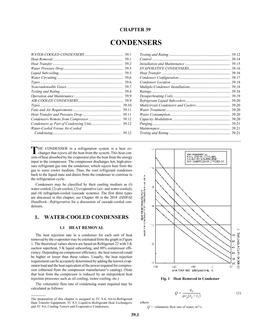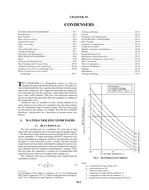
S39 — Condensers (SI)
- Comments Off on S39 — Condensers (SI)
- ASHRAE
The condenser in a refrigeration system is a heat exchanger that rejects all the heat from the system. This heat consists of heat absorbed by the evaporator plus the heat from the energy input to the compressor. The compressor discharges hot, high-pressure refrigerant gas into the condenser, which rejects heat from the gas to some cooler medium. Thus, the cool refrigerant condenses back to the liquid state and drains from the condenser to continue in the refrigeration cycle. Condensers may be classified by their cooling medium as (l) water-cooled, (2) air-cooled, (3) evaporative (air- and water-cooled), and (4) refrigerant-cooled (cascade systems). The first three types are discussed in this chapter; see Chapter 48 in the 2014 ASHRAE Handbook—Refrigeration for a discussion of cascade-cooled condensers.
WATER-COOLED CONDENSERS
Heat Removal
Heat Transfer
Water Pressure Drop
Liquid Subcooling
Water Circuiting
Types
Noncondensable Gases
Testing and Rating
Operation and Maintenance
AIR-COOLED CONDENSERS
Types
Fans and Air Requirements
Heat Transfer and Pressure Drop
Condensers Remote from Compressor
Condensers as Part of Condensing Unit
Water-Cooled Versus Air-Cooled Condensing
Testing and Rating
Control
Installation and Maintenance
EVAPORATIVE CONDENSERS
Heat Transfer
Condenser Configuration
Condenser Location
Multiple-Condenser Installations
Ratings
Desuperheating Coils
Refrigerant Liquid Subcoolers
Multicircuit Condensers and Coolers
Water Treatment
Water Consumption
Capacity Modulation
Purging
Maintenance
Testing and Rating
ISBN: 978-1-947192-53-9 (for SI versions of chapters)
ISSN: 1930-7705 (for SI versions of chapters)
Citation: 2020 ASHRAE Handbook — HVAC Systems and Equipment
Product Details
- ISBN(s):
- 9781947192539
- Number of Pages:
- 20
- Units of Measure:
- SI
- File Size:
- 1 file , 690 KB
- Product Code(s):
- D-S392020SI


